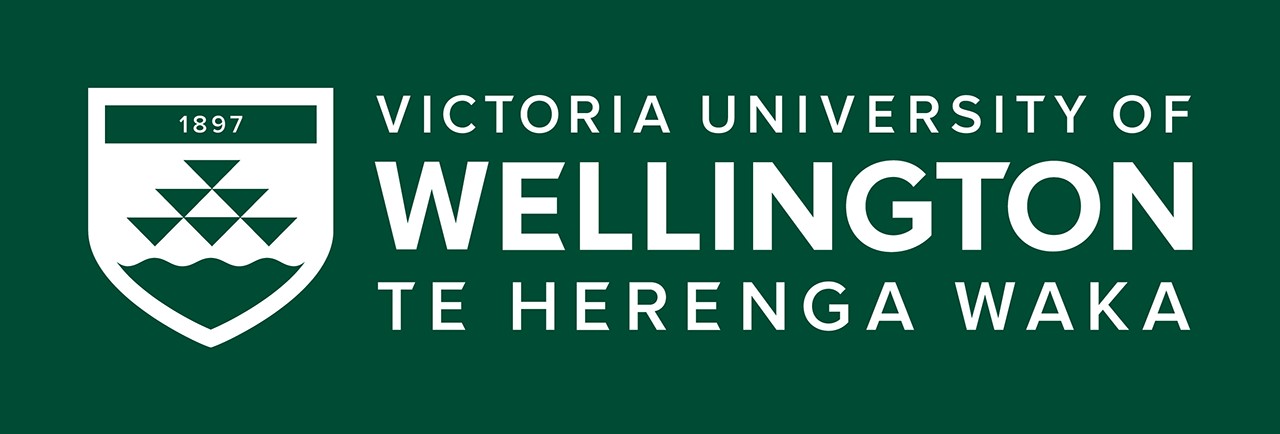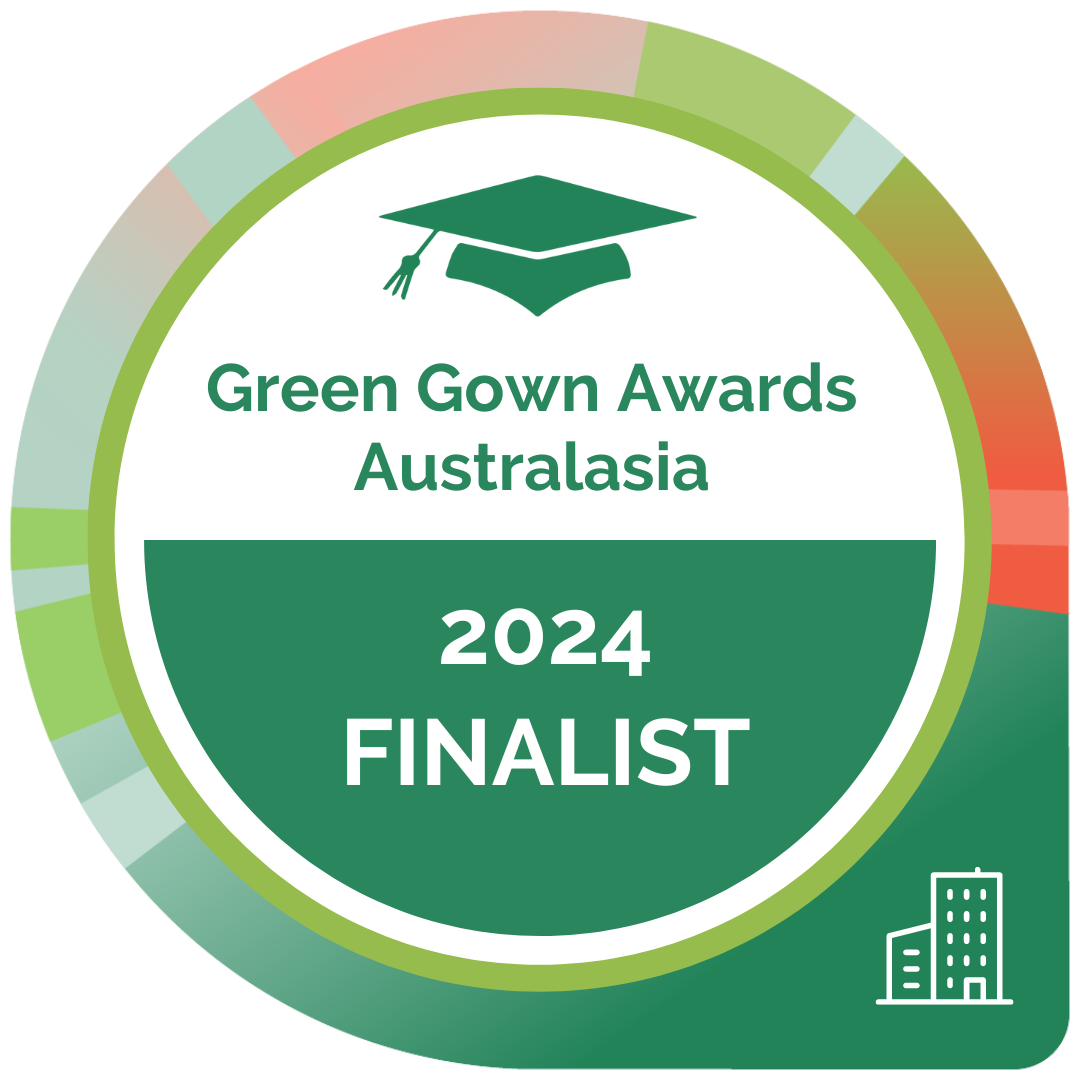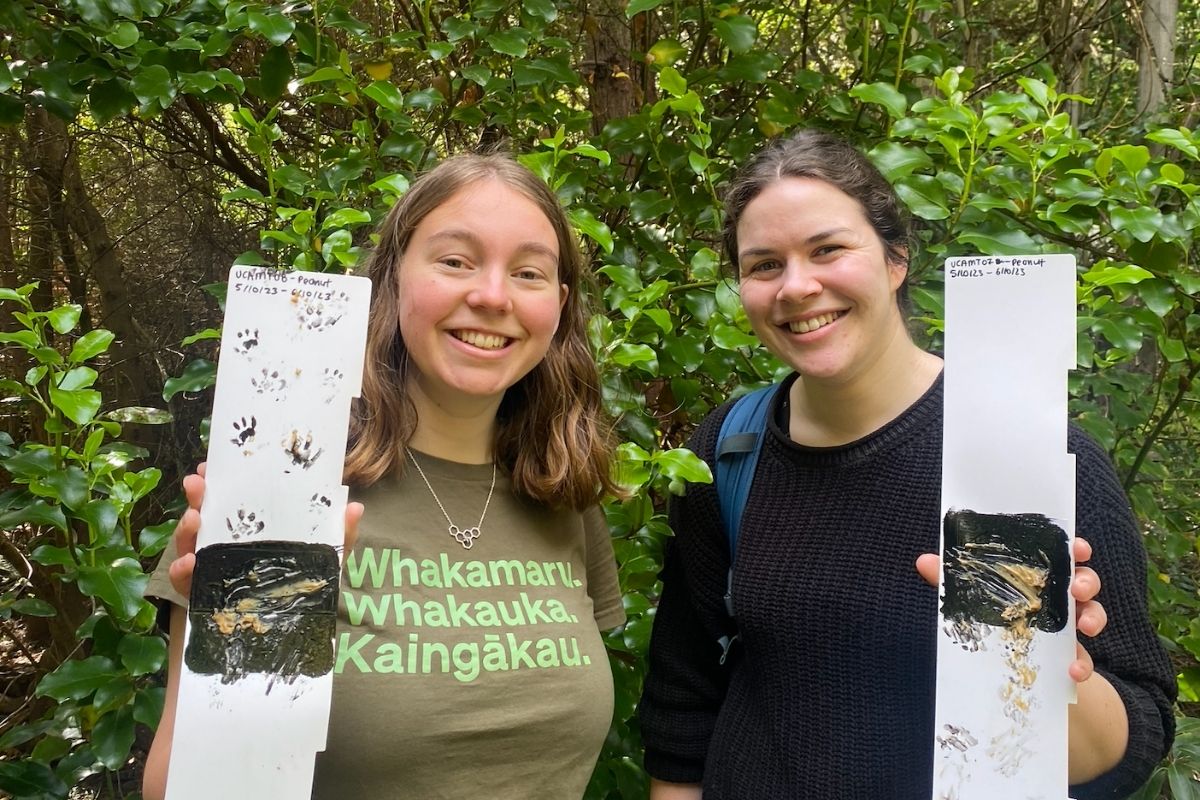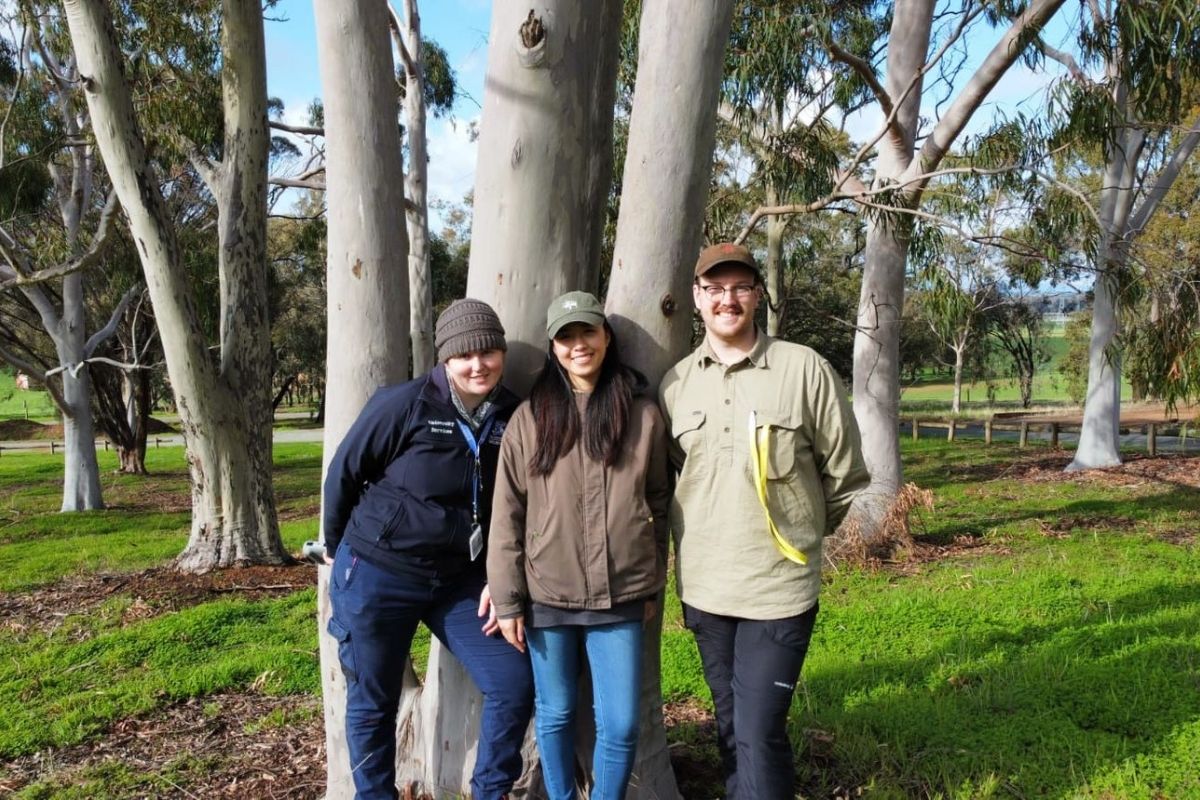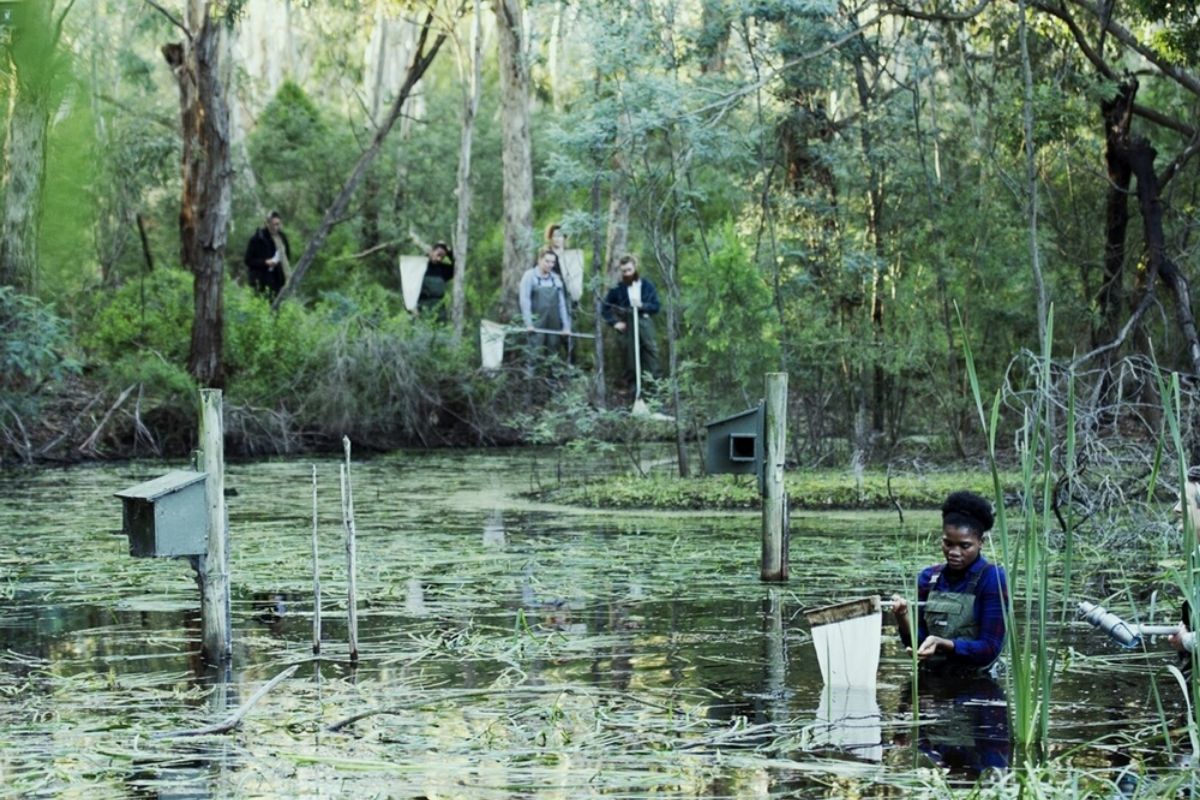Nature Positive category
Te Herenga Waka – Victoria University of Wellington (VUW) has embarked on an ambitious reforestation project titled “Growing Our Future,” aimed at enhancing biodiversity, sequestering carbon, and fostering a deeper connection between the university and the local community. This initiative involves the regeneration of a 26-hectare block of land within Wellington’s Outer Green Belt, transforming former pastureland into a thriving native forest. The project, which began in 2021, is a unique partnership between VUW and the Wellington City Council, formalised through a 33-year lease agreement. The project not only serves as an ecological restoration effort but also provides valuable teaching, research, and volunteer opportunities for students, staff, and alumni.
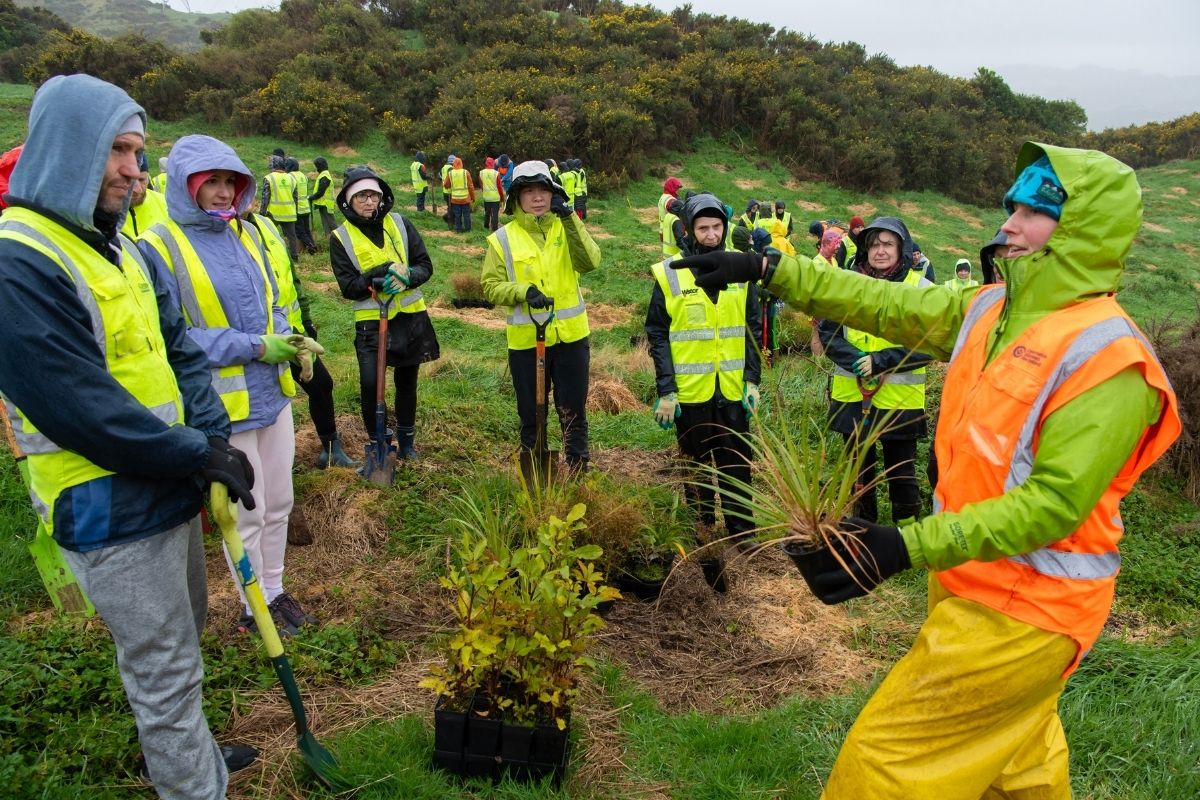
Environmental and Social Benefits
- Biodiversity Enhancement: The project contributes to the restoration of native forest cover, filling a critical gap in the 18km-long Outer Green Belt corridor. This restoration effort is expected to enhance the habitat for native species, including the endangered kiwi, which are part of the Capital Kiwi project.
- Carbon Sequestration: By planting over 10,000 native trees, the project will sequester an estimated 3,000 tonnes of carbon over the 33-year lease period, contributing to VUW’s sustainability goals and supporting New Zealand’s broader carbon reduction targets.
- Community Engagement: The initiative has engaged over 600 volunteers from the university community, including students, staff, and alumni. These planting events not only contribute to the ecological restoration but also strengthen the sense of community and connection to the natural environment.
Leadership and Engagement
- Innovative Partnership: The partnership between VUW and the Wellington City Council is a first-of-its-kind legal arrangement in New Zealand, where a public university leases public reserve land for restoration and carbon credit purposes. This sets a precedent for other institutions and local governments to collaborate on similar ecological projects.
- Academic Integration: VUW’s Centre for Biodiversity and Restoration Ecology plays a crucial role in the project, with students and staff conducting research on site characteristics, plant growth rates, and the effectiveness of native species as nursery crops. This integration of academic research with practical conservation efforts enriches the educational experience and contributes to the scientific community.
- Volunteer Engagement: The project has seen significant volunteer involvement, with annual tree planting days attracting a diverse group of participants. For many, especially international students, this has been their first experience in ecological restoration, fostering a lifelong connection to nature.
Significance to the Sector
- Scalable Model: The “Growing Our Future” project is a scalable model that can be replicated by other universities and organisations looking to engage in large-scale ecological restoration. The unique legal framework and partnership with the local council demonstrate how urban universities can contribute to regional biodiversity and climate goals.
- Sector Leadership: VUW’s leadership in this initiative underscores its commitment to sustainability and sets a high standard for integrating ecological restoration with academic and community engagement. The project’s success has the potential to influence environmental policies and practices at other educational institutions.
- Educational Impact: By providing hands-on learning and research opportunities, the initiative enhances the educational experience for students, equipping them with practical skills in conservation and environmental management.
Wider Societal Impact
- Cultural and Recreational Value: As the forest cover becomes established, the project will extend the Skyline track, a popular walking route in Wellington, enhancing public access and recreational opportunities. The project also fosters a connection to the land, contributing to the well-being of the community.
- Mental and Physical Health: The act of planting and the opportunity to connect with nature provide significant mental and physical health benefits to the volunteers, fostering a sense of well-being and environmental stewardship.
- Broader Community Impact: The project has generated significant interest and support from the wider community, as evidenced by the successful alumni fundraising campaign and the positive response from volunteers. The project’s visibility and success have the potential to inspire other community-led environmental initiatives.
The “Growing Our Future” initiative by Te Herenga Waka – Victoria University of Wellington represents a pioneering approach to urban ecological restoration, combining environmental, educational, and community benefits. Through innovative partnerships, strong leadership, and a commitment to sustainability, VUW is setting a new standard for biodiversity restoration in urban settings. This project not only enhances the natural environment but also fosters a strong sense of community and provides invaluable learning opportunities, making it a model for universities and organisations worldwide.
Top 3 learnings
Supported by

Category finalists
Nature Positive
Nature Positive
Highly Commended/Nature Positive
Highly Commended/Nature Positive
Nature Positive/Winners
Nature Positive/Winners
Past winners
Benefitting Society/Winners
Benefitting Society/Winners
Diversity, Equity & Inclusion in Sustainability/Winners
Diversity, Equity & Inclusion in Sustainability/Winners
Climate Action/Winners
Climate Action/Winners
Sustainability Institution of the Year/Winners
Sustainability Institution of the Year/Winners
Creating Impact/Winners
Creating Impact/Winners
Creating Impact/Winners
Creating Impact/Winners
Top 3 learnings
Nature Positive category
Te Herenga Waka – Victoria University of Wellington (VUW) has embarked on an ambitious reforestation project titled “Growing Our Future,” aimed at enhancing biodiversity, sequestering carbon, and fostering a deeper connection between the university and the local community. This initiative involves the regeneration of a 26-hectare block of land within Wellington’s Outer Green Belt, transforming former pastureland into a thriving native forest. The project, which began in 2021, is a unique partnership between VUW and the Wellington City Council, formalised through a 33-year lease agreement. The project not only serves as an ecological restoration effort but also provides valuable teaching, research, and volunteer opportunities for students, staff, and alumni.

Environmental and Social Benefits
- Biodiversity Enhancement: The project contributes to the restoration of native forest cover, filling a critical gap in the 18km-long Outer Green Belt corridor. This restoration effort is expected to enhance the habitat for native species, including the endangered kiwi, which are part of the Capital Kiwi project.
- Carbon Sequestration: By planting over 10,000 native trees, the project will sequester an estimated 3,000 tonnes of carbon over the 33-year lease period, contributing to VUW’s sustainability goals and supporting New Zealand’s broader carbon reduction targets.
- Community Engagement: The initiative has engaged over 600 volunteers from the university community, including students, staff, and alumni. These planting events not only contribute to the ecological restoration but also strengthen the sense of community and connection to the natural environment.
Leadership and Engagement
- Innovative Partnership: The partnership between VUW and the Wellington City Council is a first-of-its-kind legal arrangement in New Zealand, where a public university leases public reserve land for restoration and carbon credit purposes. This sets a precedent for other institutions and local governments to collaborate on similar ecological projects.
- Academic Integration: VUW’s Centre for Biodiversity and Restoration Ecology plays a crucial role in the project, with students and staff conducting research on site characteristics, plant growth rates, and the effectiveness of native species as nursery crops. This integration of academic research with practical conservation efforts enriches the educational experience and contributes to the scientific community.
- Volunteer Engagement: The project has seen significant volunteer involvement, with annual tree planting days attracting a diverse group of participants. For many, especially international students, this has been their first experience in ecological restoration, fostering a lifelong connection to nature.
Significance to the Sector
- Scalable Model: The “Growing Our Future” project is a scalable model that can be replicated by other universities and organisations looking to engage in large-scale ecological restoration. The unique legal framework and partnership with the local council demonstrate how urban universities can contribute to regional biodiversity and climate goals.
- Sector Leadership: VUW’s leadership in this initiative underscores its commitment to sustainability and sets a high standard for integrating ecological restoration with academic and community engagement. The project’s success has the potential to influence environmental policies and practices at other educational institutions.
- Educational Impact: By providing hands-on learning and research opportunities, the initiative enhances the educational experience for students, equipping them with practical skills in conservation and environmental management.
Wider Societal Impact
- Cultural and Recreational Value: As the forest cover becomes established, the project will extend the Skyline track, a popular walking route in Wellington, enhancing public access and recreational opportunities. The project also fosters a connection to the land, contributing to the well-being of the community.
- Mental and Physical Health: The act of planting and the opportunity to connect with nature provide significant mental and physical health benefits to the volunteers, fostering a sense of well-being and environmental stewardship.
- Broader Community Impact: The project has generated significant interest and support from the wider community, as evidenced by the successful alumni fundraising campaign and the positive response from volunteers. The project’s visibility and success have the potential to inspire other community-led environmental initiatives.
The “Growing Our Future” initiative by Te Herenga Waka – Victoria University of Wellington represents a pioneering approach to urban ecological restoration, combining environmental, educational, and community benefits. Through innovative partnerships, strong leadership, and a commitment to sustainability, VUW is setting a new standard for biodiversity restoration in urban settings. This project not only enhances the natural environment but also fosters a strong sense of community and provides invaluable learning opportunities, making it a model for universities and organisations worldwide.
Supported by

Related finalists
Nature Positive
Nature Positive
Highly Commended/Nature Positive
Highly Commended/Nature Positive
Nature Positive/Winners
Nature Positive/Winners
Other finalists
Climate Action

Driving Towards Tomorrow’s Campus with Vehicle-to-Grid EV Technology
As part of Flinders University’s drive to innovate and become a leader in climate action, the University launched its Vehicle-to-Grid (V2G) initiative. This involved installing and maintaining 20x V2G and smart chargers for its growing electric vehicle fleet. Leveraging 100% renewable energy generated by ENGIE’s Willogoleche Wind Farm and Flinders University’s solar power systems, this enables the storage of renewable energy in EV batteries to be discharged on campus during peak demand periods. Hence, allows for these EV fleets to operate as a Virtual Power Plant (VPP) to deliver peak demand management and optimization of behind-the-meter generation.
Overall, this initiative demonstrates the reliability and scalability of bi-directional and uni-directional smart-charging systems for EVs in reducing GHG emissions while facilitating teaching, research, and innovation opportunities. Moreover, it exemplifies a sustainable and innovative solution to scale energy storage technology and increase renewables.
Sustainability Champion – Staff/Winners

Brandan Espe
Environmental Officer / Acting Grounds Supervisor
Brandan has brought over 50 federally listed Endangered species of plant into the James Cook University living collection, many of which have never been cultivated and are found in no other collection in the world.
Of these, over half have been sustainably wild collected, inclusive of field and clone data, so they can be used for ongoing conservation, research and teaching, the remaining being sourced from private and partner organisations through favours of service or trades.
He personally funded the project from 2019-2022, until funding was awarded for the program due to its success, with the program now being engrained into the Universities landscapes for ongoing management should he leave JCU, creating a threatened species legacy collection.
The program has now expanded beyond this, with an additional 48 species now funded for further addition, some of which are only known from less than 5 sightings in history.
Student Engagement

Sustainability Leaders creating real impact!
La Trobe created a unique Sustainability Leaders volunteering program to increase engagement with students on campus and empower them to act against waste and promote sustainability. It included the following initiatives:
- Promoting the reusable crockery implementation,
- Increasing knowledge action of other students on campus to diversion comingled recycling and organic waste from landfill.
- Focus on waste audits and data,
- Improved signage through new waste posters for students living on campus.
- Collaboration with Cirka (our cleaning and waste partner) to create a waste wall and;
- Learning all things sustainability (net zero, biodiversity, waste, reusables, engagement)
These initiatives yielded significant results and with a reduction in waste contamination by almost 40% at the residential buildings and engagement with over 80 groups of people for the Reusable Revolution.
Creating Impact

Where knowledge meets habits: Empowering students for a sustainable tomorrow
Our online Sustainability Challenges offer participants an engaging, self-paced learning experience centered around a specific United Nations Sustainable Development Goal (UNSDG). Requiring minimal resourcing and at zero-cost to participants, we’ve created replicable, compact, scalable, and impactful learning opportunities that result in real impact.
The Challenges follow a structured process that moves participants from knowledge gain to simple action to celebration, to establish small but mighty habits relating to waste and carbon emissions. This approach recognises that knowledge alone is often insufficient to drive behaviour change, and that ease of action and celebration are crucial components in creating sustainable habits.
Sustainability Champion – Staff/Winners

Catherine (CeeJay) Donovan
Veterinary nurse – Anaesthesia
From establishing the Massey Vet School Green Team to leading impactful initiatives, my commitment to environmental sustainability has been making waves. With the help of my team, I have accomplished numerous small, yet meaningful actions, including integrating a sustainability lecture for final year vet students and implementing battery recycling alongside rechargeable battery use. Our larger projects encompass the introduction of green waste and soft plastics recycling bins, an energy audit resulting in power-saving measures, and playing a part in a successful rubbish audit. I spearheaded the ‘6 in 6’ campaign, empowering individuals with six simple steps for workplace sustainability. Through the SustainaVet social media pages I help to educate and inspire peers nationwide. As the Massey School of Veterinary Science sustainability champion, I had the privilege of speaking at the annual veterinary conference on sustainability in clinical practice. Currently I’m conducting pioneering research on responsible cat waste disposal. Together, we’re forging a greener future, one initiative at a time.
Sustainability Champion – Student

Louis Walmsley
SDG Coordinator Monash Association of Sustainability, Office Bearer Monash Student Association’s Environmental and Social Justice Department, Masters of Environment and Sustainability Student
Louis is an exceptional student sustainability leader at Monash University. His passion and dedication to sustainability have made a significant impact on the community. Louis’s values revolve around sustainability, which is evident upon meeting him. He actively participates in various sustainability groups, demonstrating his commitment to creating a more environmentally conscious society.
One of Louis’s notable involvements is with Precious Plastic Monash, where he organizes remarkable events and fosters collaboration among like-minded individuals, student groups, and staff. His contributions to the Monash Association of Sustainability have allowed him to conduct valuable research on plastic usage and climate action, resulting in positive changes within the university.
Through his work with the Monash Student Association, Louis has engaged hundreds of students in fun and interactive sustainability initiatives. He took the initiative to organize a sustainability food fair, which was one of the largest sustainability-related events held at Monash post-COVID. This accomplishment is a true testament to Louis’s hard work and creativity.
Louis is an outstanding student leader whose efforts in sustainability have had a lasting impact on Monash University and its community. His inspiring nature resonates with everyone who knows him.

